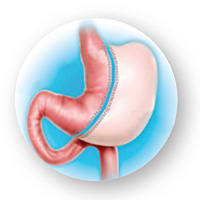
Sleeve Gastrectomy
Minimally invasive techniques and improved technologies have made this procedure a safe and effective operation.

Gastric bypass surgery has a remarkable potential for weight loss. The procedure is also known as Roux-en-Y gastric bypass and is the gold-standard bariatric surgical procedure in the United States during the past 50 years.
Gastric bypass combines restriction and malabsorption to achieve weight loss. It works by making a small stomach pouch about the size of a golf ball. The surgeon then bypasses part of the small intestine and attaches a section of the newly routed small intestine directly to the small stomach. Food consumption is restricted by the size of the remaining stomach pouch and malabsorption occurs because part of the small intestine is bypassed. As a result, fewer calories are absorbed into the body, resulting in significant weight loss.
On average, you will remain in the hospital for two days after gastric bypass surgery. After discharge, you will be required to stay on a liquid-only diet for up to two weeks and then can start consuming soft foods for another two weeks. Eating regular food, in moderation, will be possible within four weeks of surgery.
Going back to work will depend on the type of work, patient’s general health and recovery time, and therefore can vary. Typically, you will be able to return to work between two to three weeks after surgery.

Minimally invasive techniques and improved technologies have made this procedure a safe and effective operation.